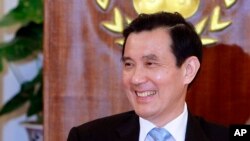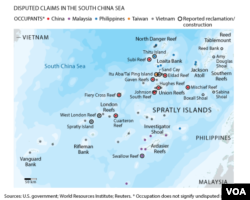The U.S. State Department has expressed disappointment at Taiwan President Ma Ying-jeou's plan to travel to Taiping island, saying such action does not contribute to the peaceful resolution of disputes in the South China Sea.
“President Ma Ying-jeou has every right to make his position clear on the South China Sea. We just disagree with this particular action. We view it, frankly, as raising tensions,” said deputy spokesperson Mark Toner on Wednesday.
Taiwan has claimed sovereignty over Taiping island since 1946. While not addressing whether Taiwan would be invited to be part of diplomatic conversations on disputes in the South China Sea, Toner said the U.S. will continue to “listen to their concerns and reflect their concerns in the various fora that address this issue.”
Ma’s office says the president will travel to Taiping island Thursday to meet with Taiwanese military personnel stationed there ahead of the Lunar New Year.
The island is in a resource-rich area at the center of territorial disputes between China and its Asia-Pacific neighbors.
Taiping is one of many islands located in the Spratly archipelago, which are claimed by Beijing and Taipei, as well as Vietnam, the Philippines, Malaysia and Brunei.
Taiwan has completed a major upgrade of its facilities on Taiping, including a new lighthouse and an expanded airstrip and port. The expansion is an apparent counterweight to China’s aggressive construction projects throughout the Spratlys.
Ma’s visit to Taiping is taking place just days after Tsai Ing-wen, head of the pro-independence Democratic Progressive Party, led her party to a landslide win in recent elections.
Ma's office said the president invited his successor to accompany him to Taiping, but the DPP said it had no plans to do so.
Former president Chen Shui-bian of the DPP visited Taiping in 2008.
Taiwan and mainland China split in 1949, when the ruling Nationalists fled to the island after losing the civil war to China’s communist forces.
Beijing considers Taiwan a renegade province, and has threatened to invade the island if it ever declares its independence.
VOA's Nike Ching contributed to this story from the U.S. Department of State







